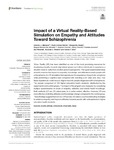Mostrar o rexistro simple do ítem
Impact of a virtual reality-based simulation on empathy and attitudes toward schizophrenia
| dc.contributor.author | Gomes Veloso, Paulo | |
| dc.contributor.author | Araújo, Margarida | |
| dc.contributor.author | Almeida, Raquel Simoes de | |
| dc.contributor.author | Correia, António | |
| dc.contributor.author | Pereira-Loureiro, Javier | |
| dc.contributor.author | Queirós, Cristina | |
| dc.contributor.author | Marques, António | |
| dc.contributor.author | Pimenta, Rui | |
| dc.contributor.author | Pereira, Anabela S. | |
| dc.contributor.author | Silva, Carlos F. | |
| dc.date.accessioned | 2023-01-18T11:02:38Z | |
| dc.date.available | 2023-01-18T11:02:38Z | |
| dc.date.issued | 2022-05-04 | |
| dc.identifier.citation | Marques AJ, Gomes Veloso P, Araújo M, Simões de Almeida R, Correia A, Pereira J, Queiros C, Pimenta R, Pereira AS and Silva CF (2022) Impact of a Virtual Reality-Based Simulation on Empathy and Attitudes Toward Schizophrenia. Front. Psychol. 13:814984. | es_ES |
| dc.identifier.issn | 1664-1078 | |
| dc.identifier.uri | http://hdl.handle.net/2183/32362 | |
| dc.description.abstract | [Abstract] Virtual Reality (VR) has been identified as one of the most promising resources for developing empathy towards stigmatized groups as it allows individuals to experience a situation close to reality from another person's perspective. This quasi-experimental study aimed to examine the impact on empathy, knowledge, and attitudes towards people with schizophrenia of a VR simulation that reproduces the experience of psychotic symptoms while performing a cognitive task compared with watching a 2D video and, thus, how these experiences could reduce stigma towards people diagnosed with schizophrenia. The sample comprised of 102 higher education health students, distributed by the experimental and control groups. The impact of the program was measured by completing multiple questionnaires on levels of empathy, attitudes, and mental health knowledge. Both methods (VR and 2D video) were, to a certain extent, effective. However, VR was more effective at eliciting attitudes and knowledge change compared to the control group. These findings suggest that not only VR but also 2D videos could be interesting strategies to enhance empathy and improve attitudes towards people with schizophrenia in higher education health students. | es_ES |
| dc.description.sponsorship | Fundação para a Ciência e Tecnologia (Portugal); UIDB/05210/2020 | es_ES |
| dc.language.iso | eng | es_ES |
| dc.publisher | Frontiers | es_ES |
| dc.relation.uri | https://doi.org/10.3389/fpsyg.2022.814984 | es_ES |
| dc.rights | Creative Commons Attribution 4.0 International License (CC-BY 4.0) | es_ES |
| dc.rights.uri | http://creativecommons.org/licenses/by/4.0/ | * |
| dc.subject | Attitudes | es_ES |
| dc.subject | Empathy | es_ES |
| dc.subject | Schizophrenia | es_ES |
| dc.subject | Stigma | es_ES |
| dc.subject | Virtual reality | es_ES |
| dc.title | Impact of a virtual reality-based simulation on empathy and attitudes toward schizophrenia | es_ES |
| dc.type | info:eu-repo/semantics/article | es_ES |
| dc.rights.access | info:eu-repo/semantics/openAccess | es_ES |
| UDC.journalTitle | Frontiers in Psychology | es_ES |






